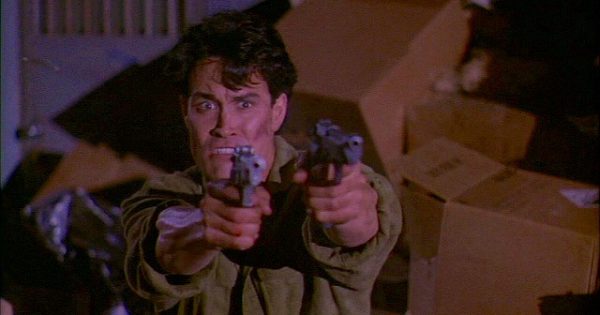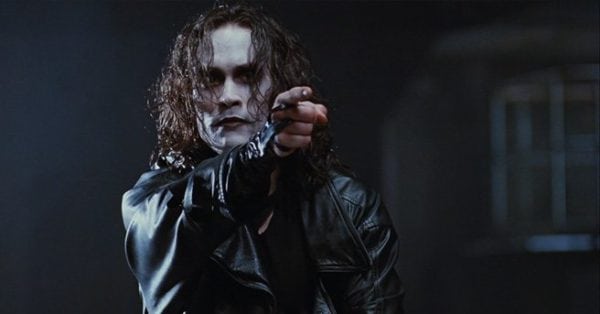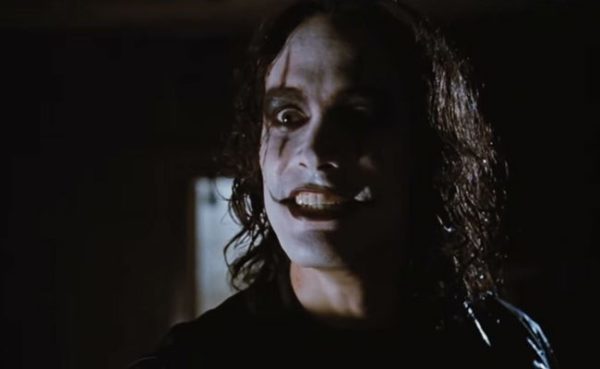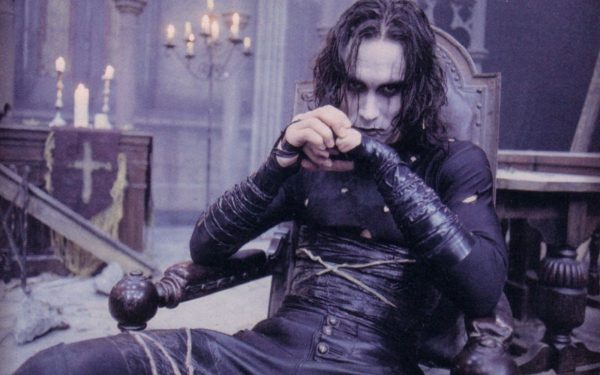Tom Jolliffe takes in a Brandon Lee triple bill of Showdown in Little Tokyo, Rapid Fire and The Crow…
The Lee legacy on cinema is no small matter. Bruce Lee of course remains more iconic and more influential, having changed the face of martial arts on screen. That should not take away the fact that Brandon Lee was taken away from the cinema world on the cusp of breaking really big. He had it all – the looks, the physique, the fighting ability. What also set him apart from many of his action contemporaries too was the fact he also had charisma in abundance and a lot of raw potential as an actor too.
Who know how Brandon Lee’s career might have transpired, or what he may have achieved, but it would be safe to say, at a minimum he would have emulated the success of folk like Jean-Claude Van Damme and Steven Seagal, perhaps eclipsed them with a little more humility in his roles and more vulnerability. He showed enough in his brief, but lasting impact on cinema, to show he was different from his father and just as talented in his own right.
To celebrate Lee’s career, I’m taking on a triple bill of his best work: Showdown in Little Tokyo, Rapid Fire and The Crow…
Showdown in Little Tokyo
Having done a few unmemorable films and appeared in a feature length special of classic show Kung Fu (which famously was supposed to star his father Bruce, before the part went, somewhat inexplicably, to David Carridine). Here Lee played second fiddle to the more established star, Dolph Lundgren. It was sold primarily as a Lundgren vehicle that happened to co-star Bruce Lee’s son.
Showdown didn’t make waves at the box office nor did it enamor critics. It would of course, like a lot of Lundgren’s films of that era, prove very popular on video. It’s great fun though. From director Mark L. Lester (Commando) it has all the elements from your standard cheesy 80’s action film (though this came a little late to be relevant). It’s wall to wall action, barely taking breath for the minimal plot. So little plot in fact, that the film only runs for about 75 minutes.
The action is good though. There’s a good mix of gunplay and some decent martial arts too. Lee and Lundgren both come from fighting backgrounds having studied their respective martial arts. Their specialist skills put to nice use here, particularly in Lundgren’s case as surprisingly rarely does he utilize his martial arts ability in his films, as it’s deemed the more effective, believable option to have him use simple brute strength more in fight scenes. Lee’s a great on screen fighter. To compare him to his father is unfair, as his father was incomparable. Brandon though, is excellent and also very acrobatic too, allowing him to show some differentiation from the old man.
Though this was derided by critics, there was still one positive that many would agree on and that was Brandon Lee. Despite the lack of plot and minimal characterisation and awfully misogynistic tone (which offers lots of unintentional laughs) Lee still came out of this with some praise, probably most of the praise directed toward the film. Even as a Lundgren fan I can say that Lee overshadowed his more established fellow action star. Lee was the rookie, whilst Lundgren was coming off the back of his first half a dozen films, all biggish productions. It was Lee’s biggest movie to date and his natural charisma came across well.
Despite the films complete silliness and brilliantly daft script there was a good chemistry between its two stars. It might be a bad film but it sure is fun. More so it would prove that Lee was ready to lead his own major studio film.
Rapid Fire
Having stolen Dolph Lundgren’s thunder somewhat, Brandon Lee then had his first significant leading role in the very enjoyable action flick Rapid Fire. One thing you can establish from watching Lee’s career, brief as it was, is that he would markedly improve with every film. It was clear that he work hard on crafting and honing his skills, not just as a punch and kicking specialist, but as an actor. He didn’t just want to open up a can of whoop ass every movie and pull two or three facial expressions, he wanted to play characters. Lee, as amiable and cheerful as he always seemed, was taking his work very seriously.
Rapid Fire sees Lee caught between two rival drug lords and some dirty feds after witnessing a murder. The only one he can trust is the cop who needs him to bring down the bad guys, played by Powers Boothe. In terms of plot this would mark a significant upturn on Showdown, not that writer Alan McElroy was in any danger of thanking the Academy.
Once again Lee provided some great fight scenes here whilst director Dwight H. Little handled proceedings well. No strange to action films he delivered a string of effective set pieces. The film looks great too. There’s also a decent score from Christopher Young and some cheesy 80’s rock on the sound-track courtesy of obscure hand Hardline (who feature former Journey guitarist, Neil Schon).
Lee is well aided by solid character actors like Boothe, Nick Mancuso and Raymond J. Barry. That said, he leads the film very well. Again, it’s the easy charisma and air of likeability that really helped Lee stand out. There’s more of a relatability and vulnerability to Lee than most of his more larger than life action contemporaries had. By this point in his career his star power was really starting to show.
Rapid Fire is by no means a classic but it is still a very well made action film, well worth a watch.
The Crow
Much has been made about the way life mirrored film in The Crow. There’s a real poignancy attached to this following the circumstances of Lee’s unfortunate and untimely death. The fact he plays a character which dies is slightly unsettling too. Just like with Bruce Lee’s death, conspiracy theories are thrown around willy nilly, but as is most likely, this was a tragic accident. What is for definite though is that here, Lee would move on from solid action fare to delivering a genuine cult classic.
The Crow’s origins came out of tragedy. Based off the comic book by James O’Barr, who wrote the graphic novel out of grief for his dead girlfriend, this is a character steeped in pathos. It’s about tragedy. Anyone who has a copy of The Crow special edition DVD and has seen the accompanying interviews with O’Barr will see just how deeply that moment in his life affected him. It’s a really fascinating insight into a really interesting guy. It was also important to note just how he despises the Hollywood system and how wary he was of having his work put to screen. Despite this he appreciated much of Alex Proyas’ vision and also felt a real affinity for Brandon Lee and what he brought to the role of Eric Draven. Given his distaste for how similar films were treated, it’s no small praise. In fact he’d become good friends with Lee, whose death would dredge up more pain for O’Barr:
“I relived the same pain and anger as before. I wished I had never written the thing, though if I hadn’t, I probably wouldn’t be here, having been consumed by my very self-destructive behaviour. I was fuelled by rage and fury for years and years. My soul felt like a hurricane. I was raised in orphanages and foster homes, and I felt, like, “When is God gonna give me a break?” When Brandon died, I felt like, “Is God trying to test my limits or what?” Why let me become best friends with the guy and take him senselessly from me? God is a bastard, if there is one.”
On a visual level, The Crow is immense. It’s dark, gothic, grimy but beautiful. Alex Proyas really had a strong visual eye in his earlier career, before being somewhat diluted by the big Hollywood studio system post Dark City. Graeme Revell’s score is great as well and there’s a suitably dark and grungy soundtrack, including a decent cover of Joy Division’s Dead Souls by Nine Inch Nails.
The cast are very good. There’s solid support from ever reliable faces like Ernie Hudson and David Patrick Kelly. Michael Wincott revels in his bad guy role. He’s fantastic and chews up scenery with a devil grinned aplomb. Mad as a bat Bai Ling also appears, playing someone mad as a bat.
As for Lee, this would be the film which truly showed his potential. Not only did he have the charisma, the fighting ability, but here, with more of a character to craft, Lee is superb. You get the sense he was getting close to becoming a really good actor. A few films down the line and he’d be doing the sort of roles many of his action cohorts just couldn’t, and indeed more dramatic actors also couldn’t too. His mix of vulnerability, charm, acting ability, physicality (not masked by crash training, wires or stunt men) was something very unique. Whilst action stars per-say would start struggling from the mid 90’s onwards, as studios preferred the every man or more dramatic actors in their action films, Lee had the tools to adapt, to always stay current. Might The Matrix have been better with a real fighter in the lead? Who knows? But Lee would have done a wonderful judge (though Keanu Reeves has a somewhat blank expression that actually worked well in the first film). Certainly though, there was enough in Lee’s arsenal to give him plenty of career scope and diversity would it have come his way.
Some may argue much of Lee’s power in the film, and much of the poignancy comes from the fact that he did die just before he’d finished his part. In some regards there is an added level of sadness to it, but that shouldn’t detract from how well Lee portrays Draven, and how much pathos he delivers. Much of the sadness of the film and indeed toward Lee is about what could have been. Where would his career have gone? We’ll never know sadly. Much like River Phoenix, so much potential that would never be fulfilled unfortunately.
With talk of a Crow remake still circulating dispute countless false starts and aborted attempts, one thing could be almost set in stone right now. That is, the original will not be bettered, nor will you find a better Eric Draven. This is one that should be left alone. Several awful sequels and a sub-par TV series were enough and I’m sure James O’Barr would agree with me.
Tom Jolliffe



















